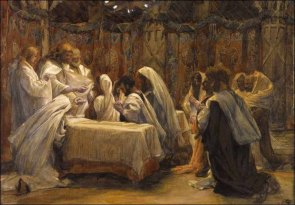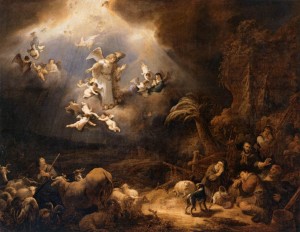Luke 24:36-48: Fulfilled
Friday, April 26, 2024

James Tissot: The Communion of the Apostles
In this Eastertide, we spend time with the Gospels of the Easter Octave, the eight days comprising the celebration of Easter. We hear Luke’s account of what takes place when the Emmaus disciples return to Jerusalem. Once again, when we reflect on a few details, the story becomes vital to our understanding the mystery and miracle of Easter.
First, we choose a translation that speaks to us most clearly. Then we reflect. If we want to hear an audio version of today’s verses, visit the USCCB site. We may find other versions by using the scripture link and drop-down menus.
In the MESSAGE translation, Cleopas and his companion went over everything that happened on the road and how they recognized him when he broke the bread.
Can we imagine ourselves listening to our colleagues as they tell us that they have witnessed a miracle? Can we envision our conversation with family and friends as we hear about their incredible interaction with the risen Christ?
While they were saying all this, Jesus appeared to them and said, “Peace be with you.” They thought they were seeing a ghost and were scared half to death.
Can we predict our reaction to the appearance of Christ among us? What do we say when we share a meal with him? Is our overwhelming emotion fear? Do suspicion and doubt take over? Do anxiety and disbelief crowd our hearts? And then we hear Jesus’ words.
“Don’t be upset, and don’t let all these doubting questions take over. Look at my hands; look at my feet—it’s really me. Touch me. Look me over from head to toe. A ghost doesn’t have muscle and bone like this.”
How do we reply?
They still couldn’t believe what they were seeing. It was too much; it seemed too good to be true.
We are startled to hear the Teacher ask: “Do you have any food here?” They gave him a piece of leftover fish they had cooked. He took it and ate it right before their eyes.

Duccio di Buoninsegna: Christ Appears to the Disciples at the Table
If we persist in a thick-headed and slow-hearted reaction, we look for ways to unravel the fraud we suspect. If we are reluctant and discouraged, we listen and watch warily, looking for reasons to doubt. If we remain hopeful and determined, we open our minds and hearts as we prepare to love and be loved. We listen to Christ’s words. We accept the joyful newness that asks to change our thinking.
Jesus says, “Everything I told you while I was with you comes to this: All the things written about me in the Law of Moses, in the Prophets, and in the Psalms have to be fulfilled. You’re the first to hear and see it. You’re the witnesses”.
We cannot do this, we are thinking. We do not have the courage or the tools. This newness is all too new, and too incredible for belief. Until Christ tells us . . . “What comes next is very important: I am sending what my Father promised to you, so stay here in the city until he arrives, until you’re equipped with power from on high”.
Christ predicts the arrival and in-dwelling of the Holy Spirit. Christ offers a gift too amazing to believe. Christ proposes a life too wonderful, too mystifying, too marvelous to believe. And yet . . .
Christ stands in the midst of us, sharing our meals, attending to our fears and doubts. Christ has fulfilled the promise of redemption made by the Living God for millennia. The choice is ours to make. Do we turn inward in our doubt? Or do we open in newness to accept the fulfillment of the promise we are offered?
For other posts on the story of Emmaus, enter the word into the blog search bar and explore.
Images from http://www.joyfulheart.com/easter/tissot-passion.htm and http://rclnotes.blogspot.com/2012/04/easter-iii-2012.html
Read Full Post »















